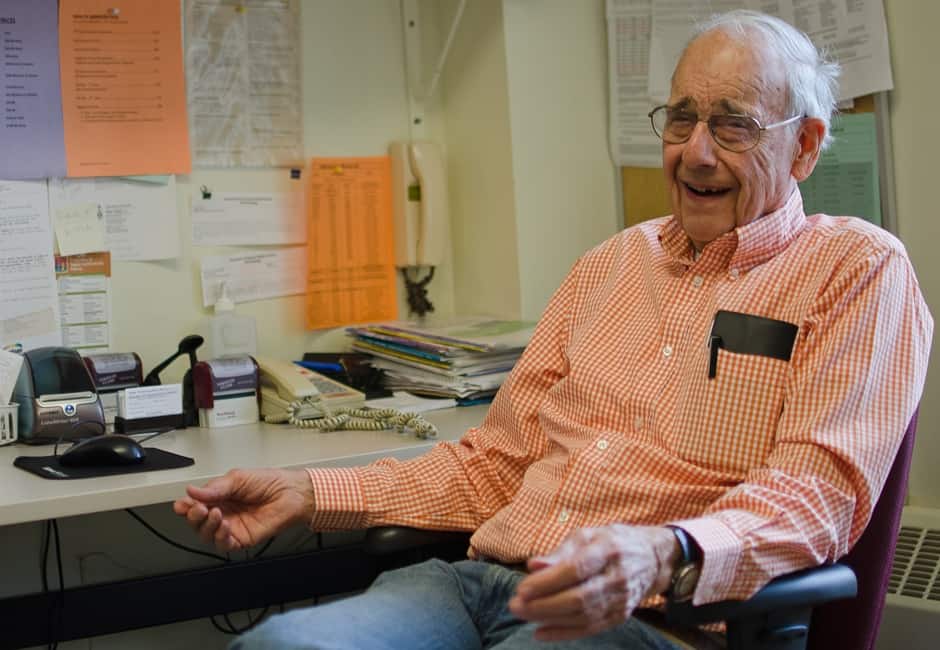Graduating from the University of Toronto Faculty of Medicine in 1954, David Smith has led a distinguished and varied career. A fixture at U of T’s student health clinic since 1957, Smith served as the university’s head staff physician, and was a founding member of the university’s Department of Family and Community Medicine. He also spent many years working with the elderly in palliative care. He began his career before the implementation of the Ontario Health Insurance Program (OHIP) but has kept abreast of modern changes in medicine.
At 85, Smith chose not to renew his medical license. As of June 1, he is no longer a practicing physician. The Varsity sat down with Smith to discuss mental health, physical activity, and lessons learned over the years.
The Varsity: Why are you not renewing your medical license?
David Smith: Continuing medical education is very onerous. I’m not interested in going home every night and sitting in front of my computer studying.
TV: What is it about student health that you enjoy so much?
DS: Think of what we’re dealing with. We’re dealing with a bunch of young people who are going to be the cream of society. At the University of Toronto, the biggest university in Canada, we need well-educated, well-rounded students, with capabilities to function in society.
An article in the [Toronto Star] a couple weeks ago said: “You’re wasting your time getting a Bachelor of Arts.” What you’re doing when you’re getting an arts degree is you’re learning to deal with things present and past that will help you handle things in the future. What you’re really trying to do is teach kids to go out into the world and be a complete person. It’s not just how much history you know, how much math you know — it’s how much you can integrate that knowledge into other human beings with whom you are interacting for the rest of your life.
TV: How have students changed over the years?
DS: I’m beginning to see an increase in mental illness — not serious mental illness — but depression, anxiety, panic attacks, [Obsessive Compulsive Disorder]. I’m now spending almost a third of my time with kids who have these illnesses, and that’s way more. It used to be 10–15 per cent. More kids are under pressure.
TV: What have you learned from students?
DS: I’ve learned that students are an amazing bunch. You see all the great kids here. I’ve seen kids who are going to be famous down the line. I’ve enjoyed seeing them. I really want to help students get themselves into society in a comfortable, sensible way. Take care of their bodies and their minds so they can be mentally and physically healthy.
TV: Have you seen this shift in anxiety-related illnesses for a long time?
DS: It’s been happening over the last three, four, or five years. It’s because of the academic pressures and the financial pressures. At the end of your academic career, it’s in questions marks — you are not 100 per cent sure that you’re going to get a job when you graduate.
TV: In your 60 years, have you ever been in trouble for your straight-shooting style? Have you ever been criticized?
DS: No. Not to my face, anyway. Most people say, “Doctors never talk to me like this!” I say, “This is the way I’ve figured out is the best way to get people to hear you so they will take your advice.” You have to think of that practicality. You can’t just talk medicine. You’ve got to talk life to [students]. The scientific doesn’t work. They hear you, but they don’t hear you. I don’t pull punches. I like to talk on their level.
TV: You spoke on June 3 at convocation for the Faculty of Medicine class of 2014. Tell me about that.
DS: Mostly, I [talked] about communication. For example, I [mentioned] the [computer]. Anything you need to know is in the computer — up-to-date stuff, good stuff. However, sometimes the knowledge you get from the computer is not helpful. It sometimes hurts the patient.
TV: If you could sum up your wisdom for all graduates — not just medical graduates — what would you say?
DS: Practice emotional and social intelligence. My daughter-in-law.is a nephrologist. She has dealt with a lot of very sick and dying people. I taught her an old trick when she was a resident at St. Michael’s hospital. Take the patients that are really sick. When you get home, sit down, phone three of the families, and tell them how the patient is. Don’t wait for them to phone you. If you’ve got a moment to sit down and phone them, and you are talking to them, and this is a person in their life who is probably going to die, that’s called care. Care is what people sense.
TV: As you’re leaving the health centre, do you want to leave a reflection?
DS: I feel very sad to leave. Let’s put it this way: I’ve been practicing medicine for 60 years. I’m going to miss it. I’m going to miss the responsibility of taking care of young men and women and older men and women as I did up to a year and a half ago. I’m very, very sad. My wife worried about me giving it up.
I want to get this healthy lifestyle thing off the ground… I want every kid that’s sitting on their butt for long periods of time to realize that this is not good for them. That’s it. That’s the legacy I want to leave: fitness and activity and enjoyment. I’ve had that, and I want every other kid to have as much fun as I had being a kid. I’m still a kid at heart.
This interview has been edited for length and clarity.


